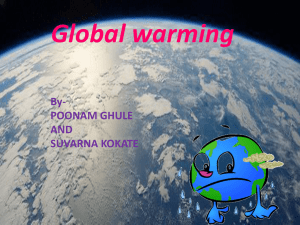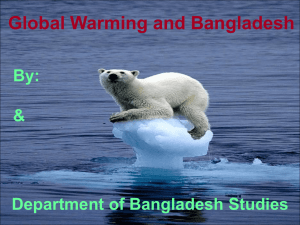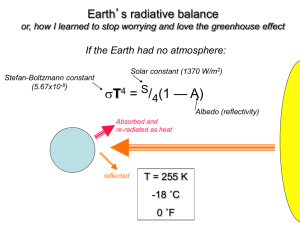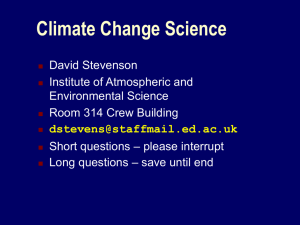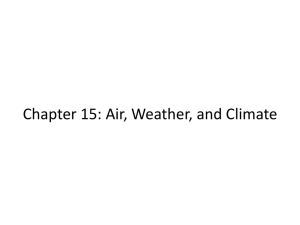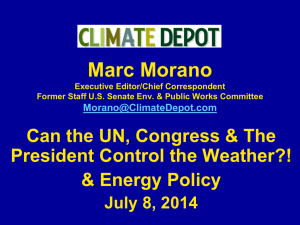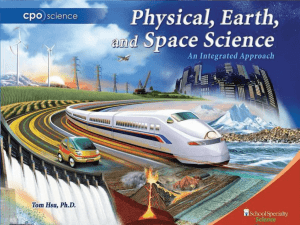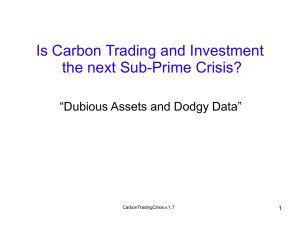Global Warming
advertisement
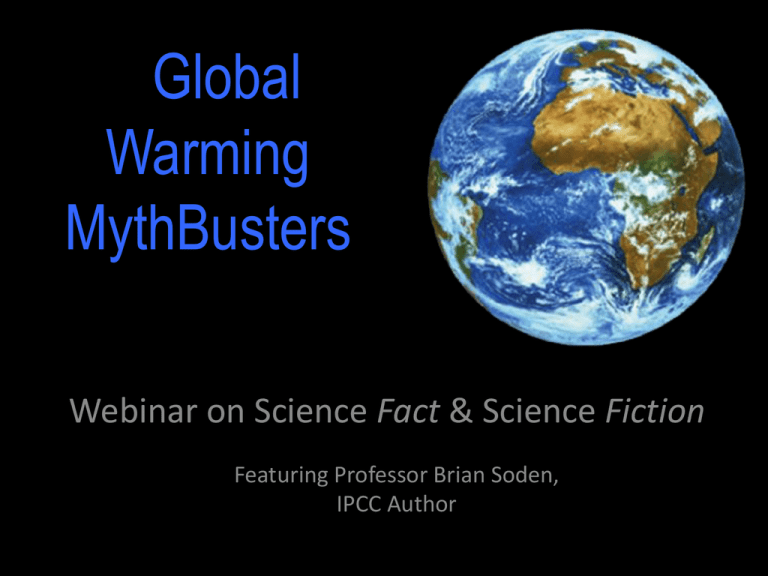
Global Warming MythBusters Webinar on Science Fact & Science Fiction Featuring Professor Brian Soden, IPCC Author Agenda • General discussion of scientific credibility • Common myths about climate change • Questions & Answers Sponsored by the Florida Business Network for a Clean Energy Economy Dr. Brian Soden • Professor of Meteorology and Physical Oceanography • Rosenstiel School for Marine and Atmospheric Science, University of Miami • Lead Author for the Intergovernmental Panel on Climate Change, WGI/AR4 • Climate change Intergovernmental Panel on Climate Change 2007 IPCC Report • Started 2004 • Completed February 2007 • 152 Authors • ~450 contributors • ~600 expert reviewers • 30,000+ review comments Contents • Summary for Policymakers • Technical Summary • 11 Chapters • Frequently Asked Questions • ~5000 literature references • ~1000 pages The IPCC Sequence of Findings IPCC (1990) “The unequivocal detection of the enhanced greenhouse effect from observations is not likely for a decade or more.” IPCC (1995) “The balance of evidence (>50%) suggests a discernible human influence on global climate.” IPCC (2001) “Most of the warming of the past 50 years is likely (>66%) to be attributable to human activities.” IPCC (2007) Actual 1995-2000 observations … one of the most important outcomes of your study could be a clear statement of our present ignorance. That in itself should indicate the need for contingency plans. - Panel Respondent The IPCC Sequence of Findings IPCC (1990) “The unequivocal detection of the enhanced greenhouse effect from observations is not likely for a decade or more.” IPCC (1995) “The balance of evidence (>50%) suggests a discernible human influence on global climate.” IPCC (2001) “Most of the warming of the past 50 years is likely (>66%) to be attributable to human activities.” IPCC (2007) “Warming is unequivocal, and most of the warming of the past 50 years is very likely (>90%) due to increases in greenhouse gases.” Myth #1 Its not warming Skeptic Argument There are problems with the data record, “urban heat island” effects, the data show no warming, the data are fudged, etc. Response • Globally, the temperature has warmed by ~1.5 F since 1880. • Temperature records with urbanization effects are removed. • Largest warming is in remote regions – Arctic, Canada, Siberia – not urban areas • Consistent indications of warming in other non-instrumental records. • Evidence for warming is unequivocal. The World Has Warmed • Globally averaged, the planet is about 0.8°C (~1.5°F) warmer than it was in 1880. • Eleven of the last 12 years are among the 12 warmest since 1880. Consistent Patterns of Warming • Mountain glaciers are retreating • Arctic sea ice is decreasing • Greenland is melting • Snow/permafrost decreasing • Sea level is rising • Ocean heat content is increasing • More intense droughts • Atmospheric moisture increasing • Heavier rainfall events • Increased heat waves WARMING IS UNEQUIVOCAL Myth # 2 “But the globe is cooling!” Skeptic Argument Global warming stopped a decade ago. The earth is actually cooling. Response • Climate change is recorded over long periods of time (at least 30 years) • Trends occur over a longer period of time than just 10 years. • The experts show no cooling trend and in fact the opposite is actually occurring (e.g., warming trend). Climate Models Expect This Observed and Predicted Changes in Global Temperature Observations Climate Model Predictions We don’t expect each year to be warmer than the previous one. Myth # 3 “It was freezing this winter. That proves global warming is wrong” Skeptic Argument 2010 was one of the coldest winters on record for Florida and SE US. Response • Globally, 2010 was the 5th warmest winter (DJF) on record. • Big difference between climate and weather. • Natural fluctuations can cause local, year-to-year variations in temperature. • The signal of global warming emerges from this background noise on larger space and time scales: decade to decade changes in global temperature. Myth #4 OK, but mankind is not causing the warming Skeptic Argument Climate change is happening, but it is a natural phenomenon. Mankind is not impacting climate. The climate has changed before man existed, so this must be natural. Response • There are natural changes in climate, e.g., ice ages, etc. But … •The changes we are seeing now are much more rapid than anything that we’ve seen naturally. • Natural causes of climate change (sun, volcanoes, orbital changes, plate tectonics) can’t explain the warming. •The observed warming is consistent with the measured increase in carbon dioxide and other GHGs. Temperature Change (oF) Evidence for Human Caused Climate Change The rate of warming over the past century is unusual. 1250 1500 1750 2000 Carbon Emissions CO2 Concentration (ppb) 1000 The rapid warming coincides with increasing carbon dioxide. 1000 1250 1500 1750 2000 Carbon Emissions from Human Activity 1000 1250 1500 1750 The increasing carbon dioxide is due to human activities, primarily burning fossil fuels. 2000 Myth # 5: You forgot about the sun Skeptic Argument If the earth is warming, then it is because of increases in solar output. Solar radiation is probably one of the most important determinants of global warming. When there is more output, our climate warms. Less output, our climate cools. Response • We can measure solar radiation output and how it changes temperature. • In the last 50 years of global warming, the sun has shown a slight cooling trend. • The current rise in temperatures cannot be explained by changes in solar output alone. • Most warming is occurring at night, not daytime. • Stratosphere is cooling while surface warms. This is inconsistent with a solar/volcano explanation. What About the Sun? Changes in solar activity contributed to the warming in the first half of the 20th Century, but can NOT explain the warming observed since the1950s. Comparison of Modeled and Observed Temperature Myth # 6: It’s a Natural Cycle, like El Nino and La Nina? Skeptic Argument Mankind is not responsible for global warming. These are just natural cycles like El Nino. They happen all the time. There is nothing we can do about it Response • El Nino and La Nina happen on very short time scales (2-3 years). They can not explain long term warming trends. • Other unidentified “natural cycles” are just speculation, not science. Myth # 7 “There is no scientific consensus.” Skeptic Argument I read a petition that showed thousands of scientists in opposition to global warming. Response • Over 97% of experts* (scientists who actively engage in research on climate change) believe that the climate has warmed and that humans are responsible for most of the warming over the past 50 years. • Petitions claiming otherwise are bogus. • If you’re still a big fan of petitions and conspiracy theories, you should like www.911truth.org * 2009 survey by Univ. of Illinois Scientific Consensus The National Academy of Sciences: “The scientific understanding of climate change is now sufficiently clear…(we urge) prompt action to reduce the causes of climate change.” 2005 Intergovernmental Panel on Climate Change: “Most of the observed increase in globally averaged temperatures since the mid-20th century is very likely due to the observed increase in anthropogenic greenhouse gas concentrations.” 2007 American Association for the Advancement of Science Society for Industrial and Applied Mathematics Ecological Society of America Botanical Society of America American Society of Plant Biologists American Meteorological Society American Geophysical Union American Geophysical Union American Statistical Association American Chemical Society Myth # 8 “Climate Gate proved there’s a conspiracy.” Skeptic Argument Response I heard about the ClimateGate scandal on Fox News. Climatologists are manipulating the truth by hiding crucial data. •The vast majority of data is available to the public and results are reproduced by multiple institutions and scientists. See www.giss.nasa.gov There is a conspiracy that squashes any scientists that isn’t on board. • Analyses are repeated and conclusions verified. • Two separate UK Parliamentary committees have investigated Climate Gate and exonerated Dr. Phil Jones of any scientific misconduct. Climategate 101: Jones e-mail of 16 Nov 1999 "I've just completed Mike's Nature trick of adding in the real temps to each series for the last 20 years (ie, from 1981 onwards) and from 1961 for Keith's to hide the decline." Myth # 10 “Climate scientists are in it for the money.” Skeptic Argument Response These scientist have a vested interest in making it seem like their research is important. • Scientists are paid to investigate things that are uncertain, not certain. Global warming alarmists and are just doing this to keep the grant dollars flowing. • By emphasizing certainty in their predictions, scientists are undermining their argument for research funds. Follow the Money www.ExxonSecrets.org Fossil Fuel Funding Since 1998, ExxonMobil has put $22,123,456 toward climate science denial. • Pat Michaels - Dr. Michaels has acknowledged that 20% of his funding comes from fossil fuel sources. • The Heartland Institute - $830,000 from Exxon • The CATO Institute - $125,000 from Exxon • American Enterprise Institute - $1,860,000 from Exxon • George C. Marshall Institute - $745,000 from Exxon • Heritage Foundation - $565,000 from Exxon These financial figures represent Exxon funding from 1998 until 2006. www.ExxonSecrets.org Questions? Resources • Florida Energy Systems Consortium www.floridaenergy.ufl.edu • Union of Concerned Scientists www.ucsusa.org • NASA’s climate change web site http://climate.nasa.gov/warmingworld/ • Climate Ethics http://climateethics.org/ • Real Climate www.realclimate.org/ • Clean Energy Works www.cleanenergyworks.us/ • American Business For Clean Energy www.AmericanBusinessForCleanEnergy.org • Clean Energy Stories www.cleanenergystories.org/ Reliability of Proxy Temperature Records

